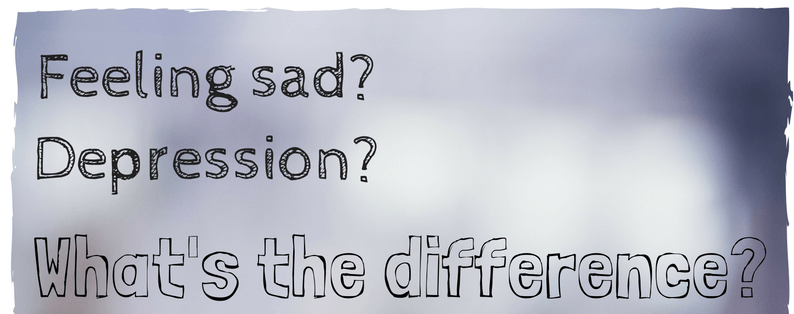Are You Depressed or Sad?
Everyone feels sadness at some point in their lives. It’s a natural reaction to situations or events that cause emotional pain or upset. Like other emotions, sadness is temporary and will fade with time. In this way, sadness is different to depression.
Depression is a longer-term condition that impairs occupational, social and other important areas of functioning. Symptoms of depression can last a long time if left untreated.
Sadness can feel overwhelming at times, but when you’re sad, you can still have moments of happiness, moments when you can laugh. Depression is different. Your feelings permeate all aspects of your life, making it almost impossible to find enjoyment anywhere, including in the activities and people you used to enjoy. Depression is a condition – not an emotion.
According to Aware (www.aware.ie), the symptoms of depression are:
Feeling - sad, guilty, anxious
Energy - feeling tired or fatigued, low energy
Sleeping - under or over-sleeping, any change to your normal sleep pattern
Thinking - poor concentration, thoughts slowed down
Interest - loss of interest in hobbies, family or social life
Value - low self-esteem
Aches - physical aches and pains with no physical basis
Life - loss of interest in living, thinking about death, suicidal thoughts
You may experience some of these symptoms when you’re sad, but probably not for more than a fortnight. Suicidal thoughts aren’t a sign of sadness but depression.
Risk Factors for Depression
Depression can affect men and women of any age, across all ethnic groupings and socioeconomic backgrounds. Although there are many risk factors for depression, having one or more doesn’t mean you’ll experience depression.
Risk factors for depression can include;
- Having experienced early childhood trauma
- The inability to cope with a devastating life event.
- Having low self-esteem.
- A family history of mental illness, including bipolar disorder or depression.
- A history of substance misuse and abuse, including drugs and alcohol.
- A lack of family or community acceptance or support for identifying as LGBTQ+.
- Difficulty in adjusting to a serious medical condition.
- Difficulty in adjusting to body changes due to catastrophic injury.
- A history of prior mental health disorders.
- Feeling you lack a support system or sense of community, such as friends, family, or co-workers.
Depression can also be a side effect of some medications. If you’re concerned about this, discuss it with your GP.
When should you get help for depression?
The short answer is:
If you experience five or more of the above symptoms for more than two weeks, talk to your GP or contact www.mindhealing.online.
If you’re thinking of hurting yourself or having suicidal thoughts, call 999 to get immediate medical support.
Therapy can help with depression
Speaking with a mental health professional can be a powerful initial step towards recovery. Your counsellor will talk to you about any symptoms you’re experiencing, how you’re feeling and how it’s affecting your day-to-day living. Your counsellor may refer you to your GP to help eliminate any underlying medical condition that may contribute to your condition, such as an underactive thyroid (hypothyroidism).
Treatment for Depression
If what you’re experiencing is sadness, making some minor lifestyle changes could help, such as;
- Connecting with other people, making a phone call, taking a yoga class, or joining a jogging club or another group that interests you.
- Build time in your day for an activity you enjoy or used to enjoy.
- Watch a funny television show or movie, or read a light-hearted or funny book.
- Take part in physical activities or sports or, if you love animals, spend time each day with a furry friend.
- Do not self-medicate through the use of drugs or alcohol.
- Treat yourself kindly by eating healthy and trying to get enough sleep.
- If you have trouble sleeping, try meditating or taking a warm bath before bed.
- Simplify your life as best you can.
- Lifestyle changes such as these can also help you feel better if you’re experiencing depression. But these changes may not be enough. If you’re experiencing depression, counselling with a professional you trust can make a difference.
Emergency Support Contact Numbers
1800 80 48 48 Aware Telephone Support
999 / 112 Emergency Services
116 123 Samaritans Ireland
1800 247 247 Pieta House







